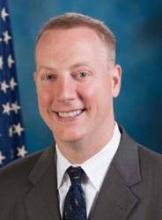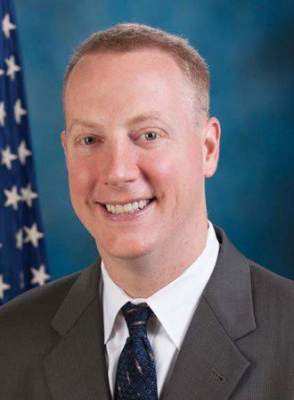User login
The federal government is offering up to $840 million to physician networks that help other clinicians improve the way that they communicate with patients and how they use technology for quality improvement.
The 4-year project, run by the Centers for Medicare & Medicaid Services, is expected to help support 150,000 clinicians nationwide and ultimately save the government between $1 billion and $4 billion.
“Clinicians want to spend time with their patients, coordinate care, and improve patient outcomes, and CMS wants to be a collaborative partner helping clinicians achieve those goals,” Dr. Patrick Conway, CMS chief medical officer, said during a press briefing Oct. 23.
The bulk of the newly available funding will go to so-called Practice Transformation Networks. Those networks will be made up of large group practices, health care systems, regional extension centers, and others that have had measurable success in improving quality by implementing electronic health records, coordinating care, or reducing hospital readmissions. The networks will be expected to provide assistance and coaching to other medical practices, especially those in rural and underserved areas.
“These networks will create peer-to-peer support, help identify proven best practices, and assist clinicians in collecting and understanding the data needed to improve quality,” Dr. Conway said.
For instance, a Practice Transformation Network might work directly with a practice on population health management, teaching the clinicians how to identify patients with multiple chronic conditions who would need a higher level of care, Dr. Conway said.
CMS expects to award about 35 grants of between $2 million and $5 million each to Practice Transformation Networks that have preexisting relationships with multiple primary care and specialty practices. The networks will also need to be able to share data between sites, according to the CMS funding announcement.
CMS will also fund Support and Alignment Networks as part of the new initiative. These networks could include medical professional associations and specialty societies that would help identify evidence-based best practices and rapidly spread them to their members. CMS said it expects to award about 30 grants for these networks, with funding ranging from $1 million to $3 million.
The funding is designed to help set physicians up for success in the midst of the changing health care delivery and payment system, where payments are increasingly tied to efficiency and quality improvement, Dr. Conway said.
“The initiative is not about giving physicians advice on how to run their practices,” he said. “Rather we are working to support clinicians and physicians and other experts to expand their improvements and transformation capacity.”
The new initiative was praised by physician organizations, including the American Medical Association and the American Osteopathic Association.
The funding “creates necessary incentives for 150,000 physicians to transform their practices by adopting new and innovative payment models, including the patient-centered medical home,” said Dr. Robert S. Juhasz, president of the American Osteopathic Association.
The application period runs from Oct. 23, 2014 through Jan. 6, 2015. CMS is encouraging potential applicants to submit a nonbinding letter of intent to apply by Nov. 20.
On Twitter @maryellenny
The federal government is offering up to $840 million to physician networks that help other clinicians improve the way that they communicate with patients and how they use technology for quality improvement.
The 4-year project, run by the Centers for Medicare & Medicaid Services, is expected to help support 150,000 clinicians nationwide and ultimately save the government between $1 billion and $4 billion.
“Clinicians want to spend time with their patients, coordinate care, and improve patient outcomes, and CMS wants to be a collaborative partner helping clinicians achieve those goals,” Dr. Patrick Conway, CMS chief medical officer, said during a press briefing Oct. 23.
The bulk of the newly available funding will go to so-called Practice Transformation Networks. Those networks will be made up of large group practices, health care systems, regional extension centers, and others that have had measurable success in improving quality by implementing electronic health records, coordinating care, or reducing hospital readmissions. The networks will be expected to provide assistance and coaching to other medical practices, especially those in rural and underserved areas.
“These networks will create peer-to-peer support, help identify proven best practices, and assist clinicians in collecting and understanding the data needed to improve quality,” Dr. Conway said.
For instance, a Practice Transformation Network might work directly with a practice on population health management, teaching the clinicians how to identify patients with multiple chronic conditions who would need a higher level of care, Dr. Conway said.
CMS expects to award about 35 grants of between $2 million and $5 million each to Practice Transformation Networks that have preexisting relationships with multiple primary care and specialty practices. The networks will also need to be able to share data between sites, according to the CMS funding announcement.
CMS will also fund Support and Alignment Networks as part of the new initiative. These networks could include medical professional associations and specialty societies that would help identify evidence-based best practices and rapidly spread them to their members. CMS said it expects to award about 30 grants for these networks, with funding ranging from $1 million to $3 million.
The funding is designed to help set physicians up for success in the midst of the changing health care delivery and payment system, where payments are increasingly tied to efficiency and quality improvement, Dr. Conway said.
“The initiative is not about giving physicians advice on how to run their practices,” he said. “Rather we are working to support clinicians and physicians and other experts to expand their improvements and transformation capacity.”
The new initiative was praised by physician organizations, including the American Medical Association and the American Osteopathic Association.
The funding “creates necessary incentives for 150,000 physicians to transform their practices by adopting new and innovative payment models, including the patient-centered medical home,” said Dr. Robert S. Juhasz, president of the American Osteopathic Association.
The application period runs from Oct. 23, 2014 through Jan. 6, 2015. CMS is encouraging potential applicants to submit a nonbinding letter of intent to apply by Nov. 20.
On Twitter @maryellenny
The federal government is offering up to $840 million to physician networks that help other clinicians improve the way that they communicate with patients and how they use technology for quality improvement.
The 4-year project, run by the Centers for Medicare & Medicaid Services, is expected to help support 150,000 clinicians nationwide and ultimately save the government between $1 billion and $4 billion.
“Clinicians want to spend time with their patients, coordinate care, and improve patient outcomes, and CMS wants to be a collaborative partner helping clinicians achieve those goals,” Dr. Patrick Conway, CMS chief medical officer, said during a press briefing Oct. 23.
The bulk of the newly available funding will go to so-called Practice Transformation Networks. Those networks will be made up of large group practices, health care systems, regional extension centers, and others that have had measurable success in improving quality by implementing electronic health records, coordinating care, or reducing hospital readmissions. The networks will be expected to provide assistance and coaching to other medical practices, especially those in rural and underserved areas.
“These networks will create peer-to-peer support, help identify proven best practices, and assist clinicians in collecting and understanding the data needed to improve quality,” Dr. Conway said.
For instance, a Practice Transformation Network might work directly with a practice on population health management, teaching the clinicians how to identify patients with multiple chronic conditions who would need a higher level of care, Dr. Conway said.
CMS expects to award about 35 grants of between $2 million and $5 million each to Practice Transformation Networks that have preexisting relationships with multiple primary care and specialty practices. The networks will also need to be able to share data between sites, according to the CMS funding announcement.
CMS will also fund Support and Alignment Networks as part of the new initiative. These networks could include medical professional associations and specialty societies that would help identify evidence-based best practices and rapidly spread them to their members. CMS said it expects to award about 30 grants for these networks, with funding ranging from $1 million to $3 million.
The funding is designed to help set physicians up for success in the midst of the changing health care delivery and payment system, where payments are increasingly tied to efficiency and quality improvement, Dr. Conway said.
“The initiative is not about giving physicians advice on how to run their practices,” he said. “Rather we are working to support clinicians and physicians and other experts to expand their improvements and transformation capacity.”
The new initiative was praised by physician organizations, including the American Medical Association and the American Osteopathic Association.
The funding “creates necessary incentives for 150,000 physicians to transform their practices by adopting new and innovative payment models, including the patient-centered medical home,” said Dr. Robert S. Juhasz, president of the American Osteopathic Association.
The application period runs from Oct. 23, 2014 through Jan. 6, 2015. CMS is encouraging potential applicants to submit a nonbinding letter of intent to apply by Nov. 20.
On Twitter @maryellenny

